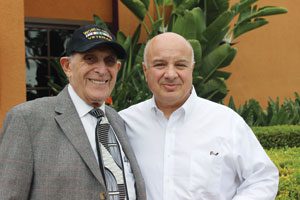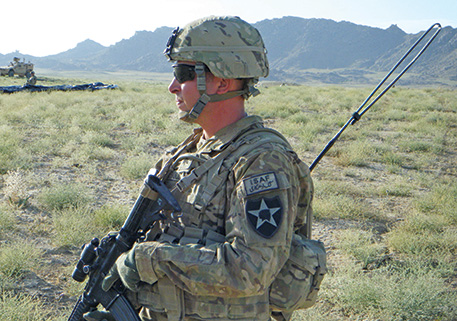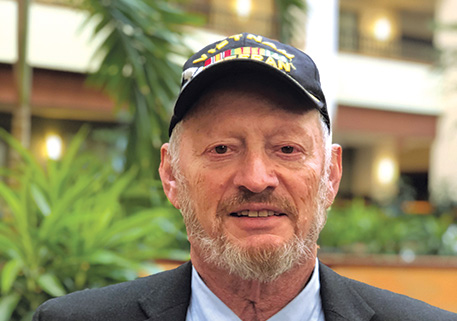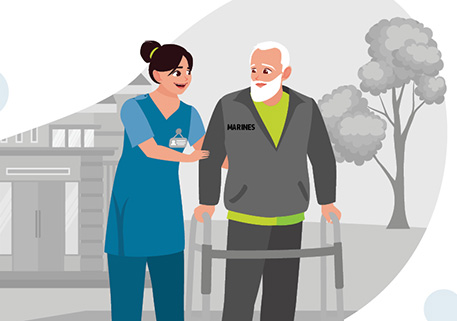After decades, target of anti-Semitism finds long overdue support

Not long ago, if you would have told Leonard “Joe” Penner that one day a fellow Jewish veteran would have a VA medical center named in his honor, he would not have believed you.
But when he attended the renaming ceremony for the Tibor Rubin VA Medical Center, in Long Beach, Calif., in May, Penner had already begun the process of healing after a decades-long battle with undiagnosed post-traumatic stress, brought on by anti-Semitic harassment during his time in service.
When Penner was drafted in 1943, he was prepared to serve his country and fight against the Nazi regime alongside his fellow soldiers.
“I was proud to be a soldier, I was proud to serve in the Army, and I’m still proud of the service I gave today,” said Penner.
The now 92-year-old faced many battles, but not the kind he expected. The teenager found himself the victim of verbal, emotional and even physical abuse at the hands of his fellow recruits—all because of his Jewish faith.
“In boot camp, there was a notice on the bulletin board for all Jewish personnel to get a day off for Yom Kippur, the holiest Jewish day. I signed up, but it was really a trick to identify Jews,” explained Penner. “After that, I was harassed quite often. They would mess up my bed, and they would hide my gear. I was shoved around, and they constantly made fun of my religion and threatened me.”
The harassment and abuse continued relentlessly through boot camp and to his first duty station. Despite fear of retaliation, Penner approached his chain of command several times with his concerns, but they dismissed the mistreatment the young man received at the hands of his fellow soldiers.
“From the top down, no one would address the abuse,” recalled Penner. “I worried all the time. I would lie in bed making sure everyone else was asleep before I closed my eyes. I never knew what they would do next.”
The harassment, abuse and heightened state of vigilance took its toll.
“I was never sick a day until I joined the Army,” said Penner. “Suddenly, I was throwing up constantly. It worsened, and they ended up hospitalizing me.
“After a series of tests, I found out I had an ulcer. Then I got a letter that I was no longer of use to the Army.”
Just shy of two years in the military, Penner received an honorable discharge for medical reasons.
Despite the barriers Penner faced in the Army, he went on to have a successful post-military career, managing dining at the famed Friars Club, where he rubbed elbows with Jerry Lewis, George Burns, Jack Benny, Judy Garland and Don Rickles.
The ulcer continued to plague Penner, but he never knew to pursue a service connection. After the urging of his wife, Annette, Penner submitted a VA claim years later and was granted a small percentage rating. Because of the impact the illness had on Penner’s day-to-day life, Annette insisted he have the claim re-evaluated.
The Penners came into the Los Angeles DAV National Service Office, and that is where they met Rafe Delli-Bovi.
“I get much more than I give in this job,” said Delli-Bovi, a fellow Army veteran who joined DAV in 2010. “When you go home at night, you know you helped someone who truly needed it. That’s better than a paycheck.”
After speaking with Penner, Delli-Bovi immediately went to work to submit for a percentage increase on the disability. Within six months, there was a favorable decision from the VA. Delli-Bovi didn’t stop there—he believed Penner was eligible for services and benefits that could address invisible wounds that Penner had tried to ignore for decades.
“I’m Italian. But I’m also Jewish. I identify with my Jewish faith, so meeting Leonard and hearing his story resonated with me,” said Delli-Bovi. “I realized almost immediately that Joe wasn’t only suffering, he had been suffering since 1943.
“The harassment and abuse he was subjected to resulted in a debilitating ulcer, as well as post-traumatic stress. He needed help, but that generation of veterans did not feel that they could address mental health concerns.”
Delli-Bovi had submitted three claims before a Jewish psychologist at the VA met with Penner, read through his paperwork and confirmed that the ongoing abuse and harassment caused by anti-Semitism could be causation for post-traumatic stress. The fourth and final submission for Penner finally granted him the overdue rating for post-traumatic stress.
Perhaps most importantly, Penner finally sought out medical attention for his invisible wounds, and he attends group therapy with fellow veterans weekly.
“In every era, men and women who served have sustained both physical and invisible wounds,” said National Service Director Jim Marszalek. “Too often veterans suffer in silence for years—and, in Joe Penner’s case, decades—before getting the assistance they need. I commend Rafe for his determination and tenacity in connecting a veteran with the benefits and services he earned that could help him on the ongoing road to recovery.”
The renaming ceremony, which he attended with Delli-Bovi, brought an additional perspective about Penner’s own experience as a Jewish veteran.
“The Tibor Rubin medical center means that we should all be proud of the fact that the facility is named after a Jewish war veteran,” he said. “It makes me proud to be an American.”






